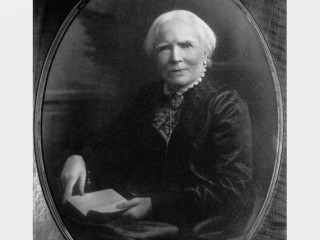
Elizabeth Blackwell biography
Date of birth : 1821-02-03
Date of death : 1910-05-31
Birthplace : Bristol, England
Nationality : British
Category : Famous Figures
Last modified : 2010-07-30
Credited as : Physician and medical doctor, reformer, womne's rights activist
15 votes so far
Early life and childhood
Elizabeth Blackwell was born on February 3, 1821, in Bristol, England to Samuel and Hannah Blackwell. Because Samuel Blackwell was a dissenter (one who refuses to accept the authority of an established church), the Blackwell children were denied public schooling. Samuel hired private tutors who went against English tradition and instructed the girls in the same subjects as the boys. Hannah Blackwell inspired her children by introducing them to music and literature.
When Elizabeth was twelve years old, Samuel Blackwell brought his family to New York, New York. Samuel Blackwell soon became a strong supporter of abolition, the movement to end slavery in America. He also established a sugar refinery in New York City and was doing quite well until the economy faltered in 1837 and he lost most of his wealth.
In 1838 the Blackwells moved to Cincinnati, Ohio, hoping for a new start. But within a few months Samuel Blackwell died, leaving his family unprovided for. The three oldest girls supported the family for several years by operating a boarding school for young women.
Seeking an education
In 1842 Elizabeth Blackwell accepted a teaching position in Henderson, Kentucky, but local racial attitudes offended her strong abolitionist beliefs and she resigned at the end of the year. On her return to Cincinnati, a friend who had undergone treatment for a gynecological disorder (having to do with women's reproductive organs) told Blackwell that if a woman doctor had treated her, she would have been spared an embarrassing ordeal. She also urged Elizabeth to study medicine. At first Blackwell disregarded the idea of becoming a doctor. But eventually her ideas changed, and the thought of becoming a doctor turned into an obsession. Friends discouraged her, though, and even recommended that, if she chose to study medicine, her best choice was to move to France, disguise herself as a man, and only then would she be accepted into medical school.
In 1845 Blackwell moved to Asheville, North Carolina, where she taught school and, with the help of physician John Dickson, studied medicine in her spare time. Her next move, in 1846, was to a girls' school in Charleston, South Carolina, where she had more time to devote to her medical studies, this time under the guidance of Dickson's brother, Samuel.
When Blackwell's attempts to enroll in the medical schools of Philadelphia, Pennsylvania, and New York City were rejected (by twenty-nine different schools), she wrote to a number of small northern colleges. In 1847 she was admitted to the Geneva, New York, Medical College. Blackwell later learned that her application to the Geneva school was initially rejected and she was only admitted as some sort of practical joke, for no woman had ever attempted to gain admittance into a medical school.
All eyes were upon the young woman whom many regarded as immoral (sinful) or simply mad. At first Blackwell was even barred from attending classroom demonstrations. Soon, however, Blackwell's quiet personality and hard work won over her classmates and teaching staff. Her graduation in 1849 was highly publicized on both sides of the Atlantic. She then entered La Maternité Hospital for further study and practical experience. While working with the children, she contracted purulent conjunctivitis, an eye infection which left her blind in one eye.
Setting up practice
Handicapped by partial blindness, Dr. Blackwell gave up her ambition to become a surgeon and began practice at St. Bartholomew's Hospital in London. In 1851 she returned to New York City, where she applied for several positions as a physician, but was rejected because she was a woman.
Blackwell then established a private practice in a rented room, where her sister Emily, who had also pursued a medical career, soon joined her. Their modest dispensary (medical office) later became the New York Infirmary and College for Women, operated by and for women. Dr. Blackwell also continued to fight for the admission of women to medical schools. In the 1860s she organized a unit of female field doctors during the Civil War (186165), where Northern forces fought against those of the South over, among other things, slavery and secession (the withdrawal of the Southern States from the Federal Union).
In 1869 Dr. Blackwell set up practice in London and continued her efforts to open the medical profession to women. Her articles and her autobiography (1895) attracted widespread attention. From 1875 to 1907 she was professor of gynecology at the London School of Medicine for Women. She died at her home in Hastings in 1910, leaving behind a legacy that would pave the way for countless generations of female physicians.
















